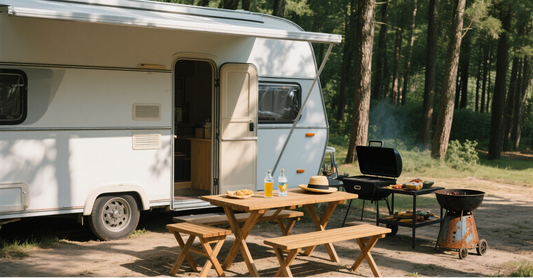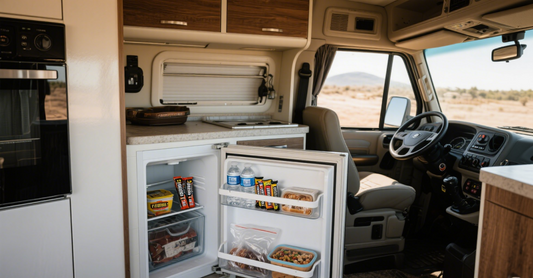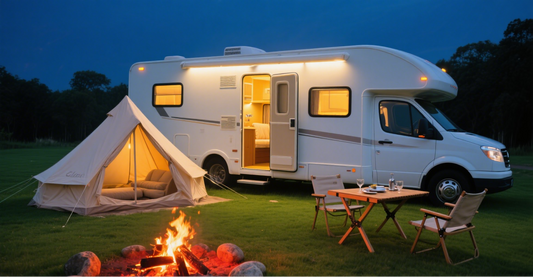How to Choose the Best Lithium Battery for RVs and Vans
Unlike traditional lead-acid batteries, lithium RV batteries offer longer lifespan, lighter weight, and greater efficiency for off-grid adventures.
The right lithium battery for your RV or van ensures reliable power for lights, fridges, or even air conditioners, wherever the road takes you.
This guide simplifies choosing the best lithium battery for camper use, helping you determine the right camper battery size and setup for your needs.


Why Choose Lithium Batteries for RVs and Vans?
Lithium iron phosphate (LiFePO4) batteries are a top choice for RV and van owners due to their superior performance over other battery types.
Let's break down their advantages in terms of performance, practicality, and cost compared to lead-acid, AGM, and gel cell batteries.
100% Deep Cycle Charge and Discharge
Lithium deep cycle RV batteries deliver 3,000-5,000 cycles (depending on depth of discharge and brand), far outlasting traditional lead-acid batteries.
This longer lifespan ensures a decade of reliable use. Lithium's high energy density provides consistent power output, even during deep discharges up to 90-100% capacity, effectively doubling usable power compared to lead-acid's 50% limit.
Unlike lead-acid, lithium resists the Peukert effect, maintaining efficiency when powering high-draw appliances like microwaves or air conditioners, making it best for full-time RVers running multiple devices.
Environmentally Friendly and Maintenance-free
Lithium batteries are maintenance free, eliminating the need for electrolyte checks or corrosion cleaning required by lead-acid batteries.
Compared with lead-acid batteries, lithium batteries are 50-60% lighter, improving fuel efficiency and easing installation in space-constrained vans or RVs.
Their low discharge rate (2-3% per month vs. 10-15% for lead-acid) ensures power retention during storage, perfect for part-time campers who park their RV for months.
Save Long-term Costs
While lithium batteries have a higher upfront cost, their cost savings come from fewer replacements and no maintenance.
They're also more efficient with solar panels, capturing up to 99% of charging energy compared to 85% for AGM batteries, reducing solar setup costs for off-grid boondockers.
For occasional campers, the initial investment may seem high, but for frequent travelers, the long-term value is significant.
The following table summarizes the main information comparison of common RV battery types to help you understand and choose the RV battery that suits you more clearly.
| Battery Type | Cycle Life | Maintenance | Weight (12V 100Ah) | Usable Capacity | Charging Efficiency |
|---|---|---|---|---|---|
| Lithium (LiFePO4) | 3,000-5,000 | None | 22-60 lbs | 90-100% | ~99% |
| Lead-Acid | 400 | High | 60-100 lbs | ~50% | ~80-85% |
| AGM | 500+ | Low | 50-70 lbs | ~50-60% | ~85% |
| Gel Cell | 1,000 | None | 50-70 lbs | ~60-70% | ~85-90% |
Key Factors to Consider for Lithium RV Batteries
Selecting the right lithium battery for camper or van use requires evaluating factors that align with your power needs and lifestyle:
- Amp-Hour (Ah) Rating: The camper battery size, measured in amp-hours, determines energy storage. A 12V 100Ah battery suits small setups (e.g., weekend camping with lights and a fan), while 12V 300Ah or larger capacity supports full-time RVers with heavy appliances like refrigerators.
- Voltage Compatibility: Most RVs use a 12V lithium battery, larger setups may need 24V or 48V. Confirm compatibility with your RV's wiring and inverter.
- Size and Weight: Lithium's compact design reduces vehicle weight, improving handling. Ensure the battery fits standard compartments (e.g., Group 24 or 31).
- Lifespan and Cycles: Seek batteries with 3,000-5,000 cycles and 5+ year warranties for reliability, especially for full-time van lifers.
- Safety Features: A robust battery management system (BMS) balances cell voltages, monitors state of charge, and protects against short circuit, overcharge, or overheating. Look for certifications like UL1973, UL9540A, or CE. For example, a quality BMS provides Bluetooth diagnostics to troubleshoot issues like overcurrent alerts on the road.
- Temperature Resilience: For winter camping in subzero conditions, choose batteries with self-heating, enabling charging down to -20°F.
- Cost vs. Value: Lithium's higher upfront cost is offset by cost savings from longevity and maintenance free operation, ideal for frequent travelers.
- Depth of Discharge (DOD): Lithium allows 90-100% DOD, doubling usable capacity compared to lead-acid, reducing the need for oversized batteries.
These factors help you choose a battery tailored to your RV or van's requirements, whether you're powering a weekend getaway or a year-long adventure.
How to Calculate Battery Capacity For Your RV Vans and Camper
To determine what size battery for travel trailer or van use, calculate your daily energy needs to ensure your lithium trailer battery meets demand:
- List Appliances: devices (e.g., fridge, lights, TV, water pump).
- Calculate Wattage: Check appliance wattage (e.g., a 12V fridge averages 40W, accounting for cycling, LED lights use 6W).
- Estimate Daily Usage: Multiply wattage by hours used to get watt-hours (Wh), then divide by 12V to convert to amp-hours (Ah). For example, a 40W fridge averaging 24 hours uses 960Wh (960 ÷ 12 = 80Ah). You can also use the RV battery calculator tool to make your calculations more convenient.
- Account for Losses: Add 10-15% for inverter losses for AC appliances (e.g., a 100W TV may consume 110W).
- Add a Buffer: Include a 20-30% buffer to avoid deep discharges, extending battery life.
For example, a weekend camper with lights (6W x 5 hours = 30Wh), phone charger (10W x 3 hours = 30Wh), and fridge (960Wh) needs ~1,020Wh (85Ah), so a 100Ah battery suffices.
A full-time boondocker with a coffee maker (800W x 0.5 hours = 400Wh) and heater (500W x 2 hours = 1,000Wh) may need 300Ah+.
To optimize battery power, use LED lights, turn off unused devices, and schedule high-draw appliances during peak solar hours.
The following also tailors the selection options for you based on the sizes of common RV types, helping you choose the best lithium battery based on your own power usage needs and RV size.
| RV/Van size | Appliances Powered | Recommended Battery Capacity |
|---|---|---|
| 10'–14' (Small Vans) | Lights, phone charging, small fan | 100–135Ah |
| 15'–20' (Mid-Size) | Small fridge, fans, electronics | 135–200Ah or 2x100Ah |
| 21'–30' (Larger RVs) | Fridge, small TV, stove | 200–315Ah or 2x100Ah |
| 31'–40' (Large RVs) | Medium fridge, large TV, fans | 315Ah or 2–4x100Ah |
| 40' + (Luxury RVs) | Fridge, AC, large appliances | 560Ah+ or multiple batteries |
How to Pair Lithium RV Batteries with Solar Panels
Pairing lithium RV batteries with solar panels ensures reliable off-grid power. Lithium's high energy density and low discharge rate (2-3% per month vs. 10-15% for lead-acid) maximize solar efficiency. Here's how to build an effective setup:
- Determine Solar Capacity: Match panel wattage to battery capacity and daily energy needs. A 100Ah battery needs 100-200W to recharge in a day (5-6 hours of peak sunlight with MPPT).
- Use Multiple Panels: Multiple 100W solar panels fit RV roofs with vents or air conditioners and provide redundancy if one fails. Orient panels south (Northern Hemisphere) and tilt when parked for optimal efficiency.
- Choose MPPT Controllers: MPPT controllers enable fast charging, recharging a 100Ah battery in 5-6 hours vs. 7-8 hours with PWM, capturing 20-30% more energy.
- Winter Considerations: Oversize panels by 20-30% for shorter winter days. Clean panels regularly to remove dust or snow, ensuring maximum output.
- Alternative Charging: Use a DC-DC charger to supplement solar via your vehicle's alternator, ideal for cloudy days or long drives.
The following summarizes how many watts of solar panels are needed to achieve optimal performance when paired with batteries of different capacities for RVs of different sizes:
| RV/Van Size | Battery Capacity | Recommended Solar Capacity |
|---|---|---|
| 10'–14' | 100–135Ah | 100W (1x 100W panel) |
| 15'–20' | 135–200Ah | 100–200W (1–2x 100W panels) |
| 21'–30' | 200–315Ah | 200W (2x 100W panels) |
| 31'–40' | 315Ah | 400W (4x 100W panels) |
| 40' + | 560Ah+ | 600W (6x 100W panels) |
Electrical System Upgrades for Lithium Batteries
To optimize your lithium deep cycle RV battery, consider these upgrades:
- Best RV Lithium Battery Charger: Use a 14.4-14.6V charger, like Temgo 14.6V 20A LiFePO4 charger, for fast charging (~5-6 hours for 100Ah). Avoid lead-acid chargers.
- Converter: Upgrade to a lithium-compatible converter (e.g., Progressive Dynamics PD9160ALV) for efficient shore power charging.
- Inverter: A 1200W inverter suits small RVs, larger setups need 2000W+ for appliances like microwaves.
- DC-DC Charger: Charge via your vehicle's alternator (e.g., Orion-Tr Smart) for road trips.
- Battery Monitor: Use a Bluetooth monitor (e.g., Victron Smart Shunt) for real-time battery power data.
- Wiring Safety: Use 4-6 AWG wires for inverters, with a 100-200A fuse to prevent short circuits. Check connections monthly to ensure stability.
For full-time RVers, test your system under load (e.g., running all appliances) to confirm compatibility and troubleshoot BMS alerts (e.g., overcurrent) using the monitor's app.
RV Batteries Installation and Maintenance Best Practices
Installation requires careful handling. Compared to other uses, installing and maintaining lithium batteries for campervans is very simple. You can complete it by following the steps below:
- Installation: Securely mount the battery in a ventilated compartment (e.g., Group 24 or 31 sizes) using a torque wrench (e.g., 10-12 Nm for terminals). Use 4-8 AWG wiring and verify BMS compatibility. Check polarity to avoid short circuits.
- Maintenance: Lithium batteries are maintenance free, but check BMS alerts via app. Store at 0–45°C with 50% charge. Check terminal torque every 6 months to prevent loosening during RV travel.
- Common Pitfalls: Don't mix lithium with lead-acid batteries or use incompatible chargers. Address BMS alerts (e.g., high temperature) by reducing load or improving ventilation.
- Disposal: Recycle at certified facilities like Call2Recycle to minimize environmental impact.
If you are considering upgrading your RV battery, Temgo offers a range of 12V batteries with capacities from 100Ah to 460Ah.
All our batteries are equipped with built-in BMS safety protection features and support Bluetooth connectivity to a mobile app for real-time monitoring.
Additionally, Temgo's 12V lithium RV batteries come with an LCD display and feature low-temperature protection and self-heating functionality. You can select the most suitable travel vehicle battery based on your specific usage requirements and environmental conditions!
Conclusion
Choosing the best lithium RV batteries means evaluating your daily energy needs, lifestyle, and budget.
Lithium deep cycle RV batteries offer a longer lifespan of 3,000-5,000 cycles at 80-100% DOD, high energy density for compact size, and maintenance free operation, saving time and money.
By calculating your power needs, selecting a battery with a robust battery management system, and integrating solar panels, you can enjoy reliable off-grid power for weekend trips or full-time adventures.
Temgo batteries offer a trusted solution for RV and van owners. Our 12V LiFePO4 batteries, feature advanced BMS with Bluetooth monitoring, self-heating for winter camping, and certifications like CE and FCC for safety.
With up to 5,000 cycles at 80-100% DOD and IP65 waterproof ratings, Temgo ensures durability for rugged RV travel.
Visit Temgo shop to explore our lithium RV batteries range or contact our team for tailored advice on powering your next adventure.


